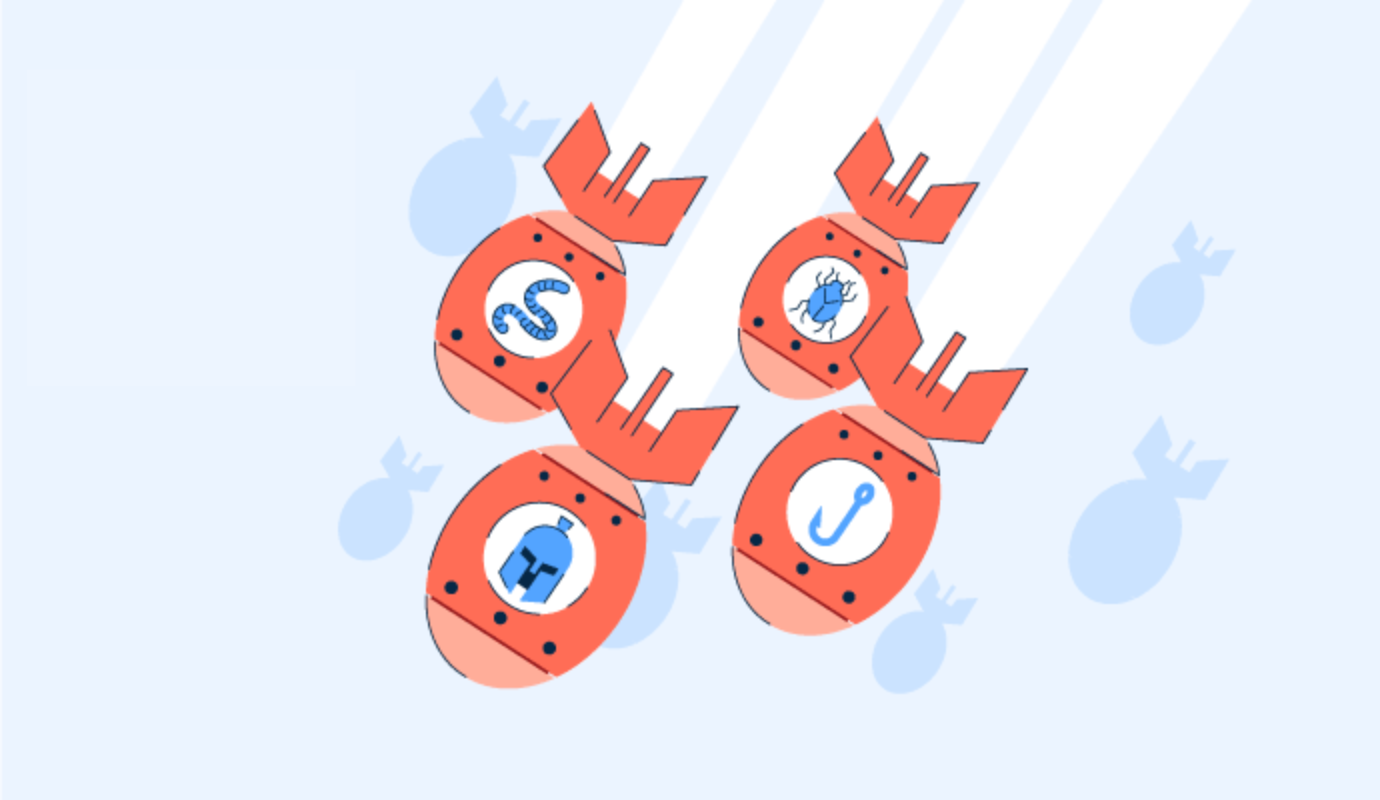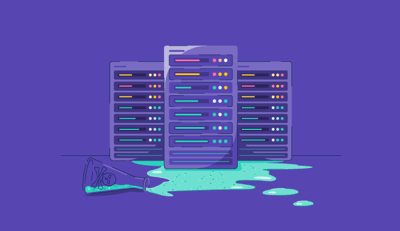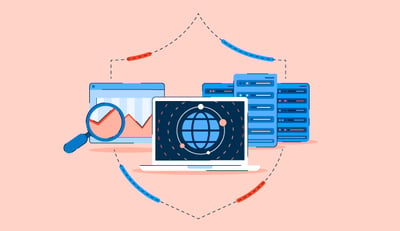December 18, 2024
 by Holly Landis / December 18, 2024
by Holly Landis / December 18, 2024

If you’re reading this, there’s a good chance that your business has a website. To get to that site, you likely use something like YourBusinessName.com. This is made possible by domain name systems (DNS).
Without DNS, every website would be a combination of numbers rather than easy-to-remember words! Your website is one of your important business assets, especially if customers can schedule and pay for services online. Which is why cybercriminals want a piece of that pie too.
As hacking and other forms of online crime increase, it’s vital that you know about one of the most detrimental — DNS attacks. Here's how you can manage risks they pose to your organization. Having robust DNS security solutions in place is one of the best ways to mitigate the risk that these attacks can cause, particularly as hackers continue to become smarter at exploiting system vulnerabilities.
DNS attacks are malicious attempts by hackers to take over a DNS by intercepting or hijacking traffic from a user’s device to a web server. Through manipulating these communication channels, cybercriminals exploit users for valuable information.
Typically, these attacks trick users into handing over personal or a business details through phishing or infecting their device with malware. Once hackers have this information, they can steal money, customer or business records, or even commit identity theft.
DNS attacks can cost businesses millions of dollars every year. With such valuable information at stake, it's no surprise that government agencies were among the most targeted organizations for DNS attacks in 2023, with figures suggesting a monumental 4,000% increase over 2022. That’s why it’s vital that companies understand how DNS attacks work and what can be done to avoid these risks.
DNS systems are built on hierarchies within servers, storing information about website domain names, and their internet protocol (IP) address (location of where that website is based).
By typing in a domain name with correctly-configured DNS settings, the user’s browser will send a DNS query to the local DNS resolver, which looks up the associated IP address. From there, the query will be routed to the IP address, and the user will be directed to the correct website.
When a DNS attack occurs, vulnerabilities in this communication system are exploited by criminals. They intercept the query and send a fake response, redirecting the user to the wrong IP address. Depending on the type of attack, this manipulation can lead to stolen data or other malicious outcomes.
There are several different types of DNS attack which can be used individually or, in sophisticated attacks, combined to impact multiple areas of a business. Some of the most common are:
For companies that fail to protect their DNS infrastructure, the potential risks of a DNS attack can have significant and lasting impacts on the business. These include:
Besides the risk of losing financial records or, even worse, money itself from credentials stolen in a DNS attack, there’s also the possibility that these attacks can cause lasting issues for creating new revenue.
Particularly in a DDoS attack where your site may be offline even for a short period of time, customers will be unable to make purchases online and may not return later to complete their transactions, which can result in long term revenue decline.
Industries like finance and healthcare, and even ecommerce businesses handle customer payments every day. A DNS attack can expose thousands of confidential records to cybercriminals.
Industries that are governed by strict compliance regulations will likely face significant fines, legal action, and long-term reputational damage as a result of a DNS attack and data breach.
Critical functions within your business can be brought offline during a DNS attack. Not only does this impact your customers on the outside of the company, but it can also cause severe disruption within your organization.
Internal operations going down result in decreased productivity and a backlog of work that needs to be completed once systems are restored.
When a customer works with you, they expect their information to be protected. Without this, your business’s reputation can decline rapidly, making it harder to retain existing clients or attract new ones in the future.
Not only is the reputation of your organization at stake to the outside world, but it can also erode your employees’ trust in you. Their personal information could be just as at risk as those of your customers when a DNS attack happens, particularly information held by HR. Rebuilding this trust both internally and externally takes significant time and money.
How to prevent DNS attacks is a crucial step for individuals as well as organizations. Let's look at some best practices.
Most DNS systems are built for functionality rather than security, which makes them easy targets for attack. With increasing numbers of cyberattacks occurring each year, it’s vital to take proactive steps to mitigate the risk to your business by implementing best practices such as:
Using a DNS security solution is one of the best ways to filter DNS traffic, identify potential malware, and block suspicious activity coming through your DNS system. Businesses are able to protect employee endpoint devices as well as their own servers from harmful activity.
To be included in the DNS security solutions category, platforms must:
* Below are the top five leading DNS security software solutions from G2’s Summer 2024 Grid Report. Some reviews may be edited for clarity.
Cisco Umbrella provides high-compliance security solutions in a single, cloud-native solution. With DNS-level security and secure gateways, your business data is protected by one of the world’s most powerful cyber threat intelligence teams.
“Cisco Umbrella offers an intuitive and easy-to-use management platform. The policies are easy to build and construct, and deploying to on-prem and mobile users can be done in a matter of minutes.”
- Cisco Umbrella Review, Kevin A.
“I would prefer if there were some changes to the UI and ease of access. It was kind of daunting to use it at first, as I found the learning curve to be quite steep.”
- Cisco Umbrella Review, Aman V.
As the world’s first connectivity cloud, Cloudflare Application Security and Performance provides security solutions for all your web applications and APIs, no matter where they’re hosted or where your users are based. The software has an easy to use interface, where you can integrate and manage multiple applications at once.
“The best part about Cloudflare CDN is their generous free tier plan that helps indie developers to start with and experiment with things.”
- Cloudflare Application Security and Performance Review, Anubhav G.
“I found it a bit technical. Your website may be down if you make any changes without knowing the consequences. Also, I migrated my domain to Cloudflare and I feel that some of my DNS records are missing.”
- Cloudflare Application Security and Performance Review, Manish S.
DNSFilter is an industry-leading DNS threat protection and content filtering tool. Powered by machine learning and AI, this software offers protection against malware, ransomware, and phishing attacks on DNS systems for companies of all sizes.
“I like how easy it is to script the installation on client computers. It has prevented my users from accessing sites registered in the last 30 days which has helped to prevent a phishing scam.”
- DNSFilter Review, Chris R.
“VPN use with the agent is a hard no. It causes issues with users being able to access sites they normally would be able to. Support does not give a work around for this.”
- DNSFilter Review, Matt C.
Whether your assets are in the cloud or stored in your datacenter, Infoblox NIOS gives you greater control over your network settings and security protocols. This software can be integrated into any network environment, making it quick and easy to protect your most valuable business data.
“Infoblox NIOS provides visibility across your network by consolidating data from DNS and DHCP services and eventually forming what they called the "single source of truth." which is the IPAM. It is easy to use in management since all configurations must be done on a single platform, even without direct access to appliances distributed across the network.”
- Infoblox NIOS Review, Mark Razel M.
“The licensing cost should be waived for the primary platform, all other services also involve a cost for licensing.”
- Infoblox NIOS Review, Anvar A.
BloxOne DDI is a DNS firewall that gives you proactive network protection against new and evolving malware threats. This tool provides security against DNS-level threats, allowing you to control and manage your security measures in a cloud-based environment.
“Ability to detect viruses communicated by DNS servers together with the DHCP service. Automatic blocking of communication from a program or device to an Internet connection, detection of domains, known IPs of malware, theft of information and identities.”
- BloxOneDDI Review, Jake M.
“Pricing of this solution is too high and is not affordable for small level organizations. The in-house model has a very high price which is not a good solution for small level organizations.”
- BloxOne DDI Review, Zeeshan A.
DNS attacks can be carried out through various techniques, such as:
DNS attacks can have severe consequences, including:
To protect yourself from DNS attacks, you can:
An example of a DNS poisoning attack could be redirecting users to a malicious website instead of a legitimate one. For instance, an attacker might poison a DNS resolver to redirect users from "[invalid URL removed]" to a fake website that looks like Google but is designed to steal user credentials.
DNS attacks continue to pose a significant threat to online security for businesses of all sizes. By proactively addressing how you could mitigate these risks with strong protection measures, you can keep your vital business assets safe in this ever-changing world of cybercrime.
Monitor your web traffic and stop a DNS attack before it happens with DDoS protection tools that deflect malicious attempts to infiltrate your network.
Edited by Monishka Agrawal
Holly Landis is a freelance writer for G2. She also specializes in being a digital marketing consultant, focusing in on-page SEO, copy, and content writing. She works with SMEs and creative businesses that want to be more intentional with their digital strategies and grow organically on channels they own. As a Brit now living in the USA, you'll usually find her drinking copious amounts of tea in her cherished Anne Boleyn mug while watching endless reruns of Parks and Rec.
Given the rapid pace of technological development, attackers are constantly finding new ways...
 by Samudyata Bhat
by Samudyata Bhat
A domain name system (DNS) helps your computer find websites you want to visit. It does this...
 by Sagar Joshi
by Sagar Joshi
If your business sends more than 5000 emails daily, DMARC is no longer optional.
 by Soundarya Jayaraman
by Soundarya Jayaraman
Given the rapid pace of technological development, attackers are constantly finding new ways...
 by Samudyata Bhat
by Samudyata Bhat
A domain name system (DNS) helps your computer find websites you want to visit. It does this...
 by Sagar Joshi
by Sagar Joshi


